Outdoor Garden Rabbit Guide | The Benefits of Keeping a Backyard Rabbit
Having a backyard rabbit makes a great addition to your garden and your farm! Read this week’s post for the all the beneficial reasons why!
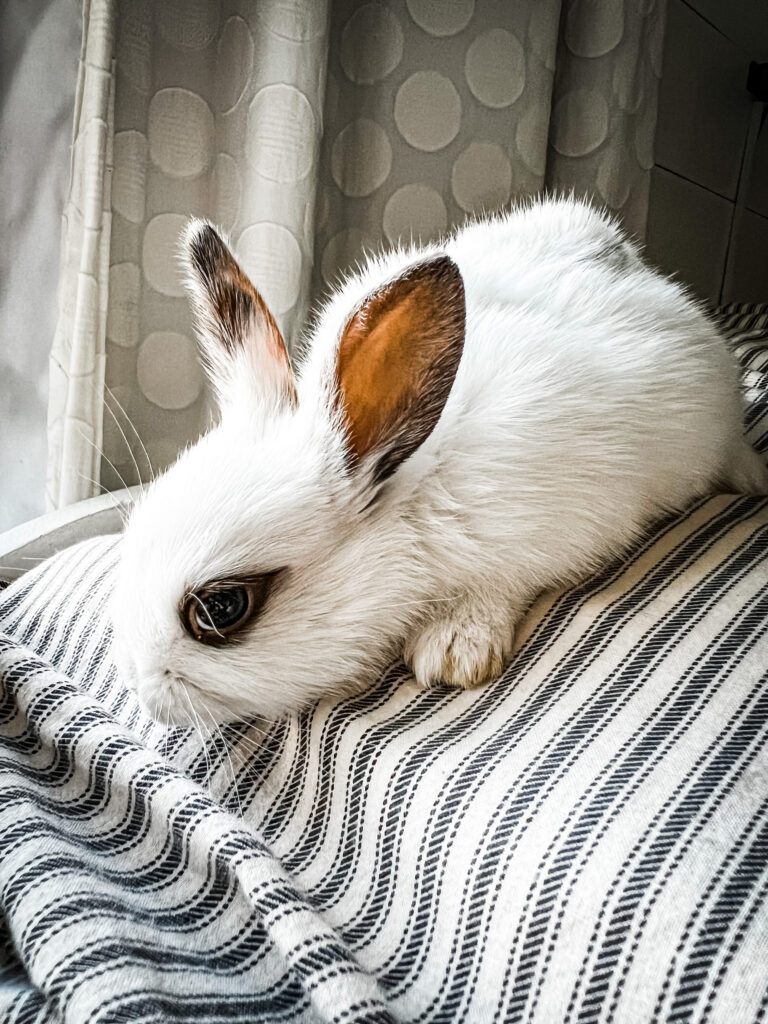
Though often debated, we have found success in keeping a rabbit on our cut flower farm. Besides from being arguably one of the most adorable pets you can have, rabbits are a diligent keystone species that aids in garden maintenance. Most property owners will have to (or have already had to) deal with a rabbit in their garden and before you label them pesky, let me help show you how they can be a great asset!
This blog is coming from the perspective of having domestic rabbits. Our pet rabbit Otis (pictured below) unfortunately passed away a month ago but was a loved addition to our family and our garden. The newest addition to our family is Pip (pictured above)! She will soon be out and about helping us in the garden starting this season (in between snuggles with us and the kids of course!).
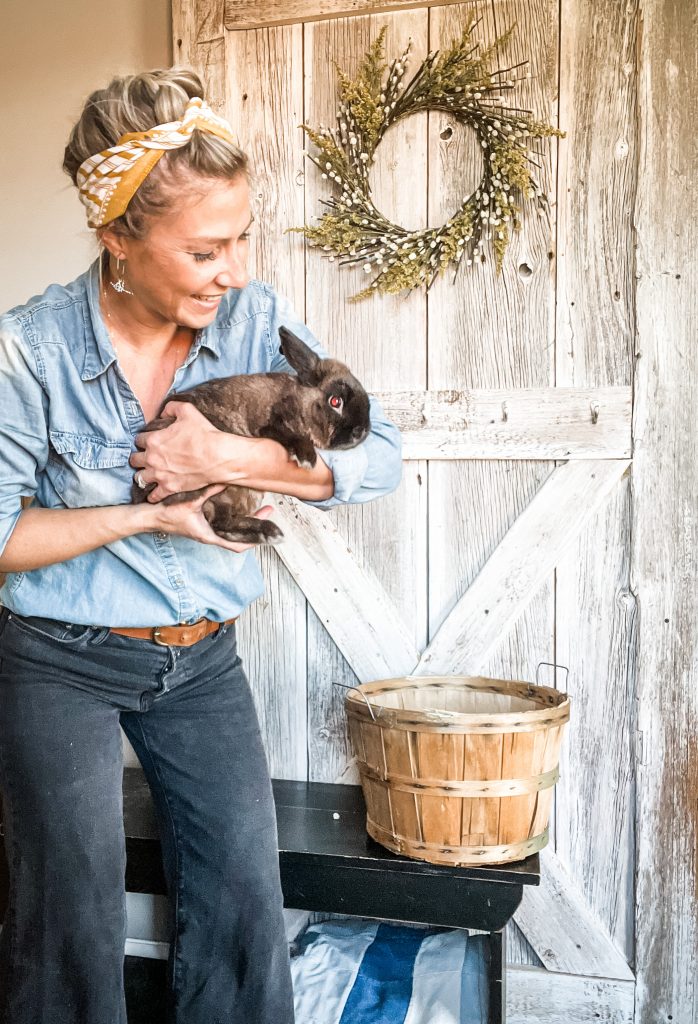
Benefits of a Backyard Rabbit – Why have one?
1. Rabbit Manure
In any flower or vegetable garden, rabbit manure is a huge benefit. Their manure helps improve poor soil structure, facilitate drainage, and absorb moisture. A benefit for you, as the owner, is that it’s not as smelly as other manures and it’s small meaning it’s a lot easier to handle. Owning a rabbit means you will have a constant supply of it. Rabbit poop contains nitrogen, which gives plants their vivid green color and provides vegetable crops with the energy they need to grow!
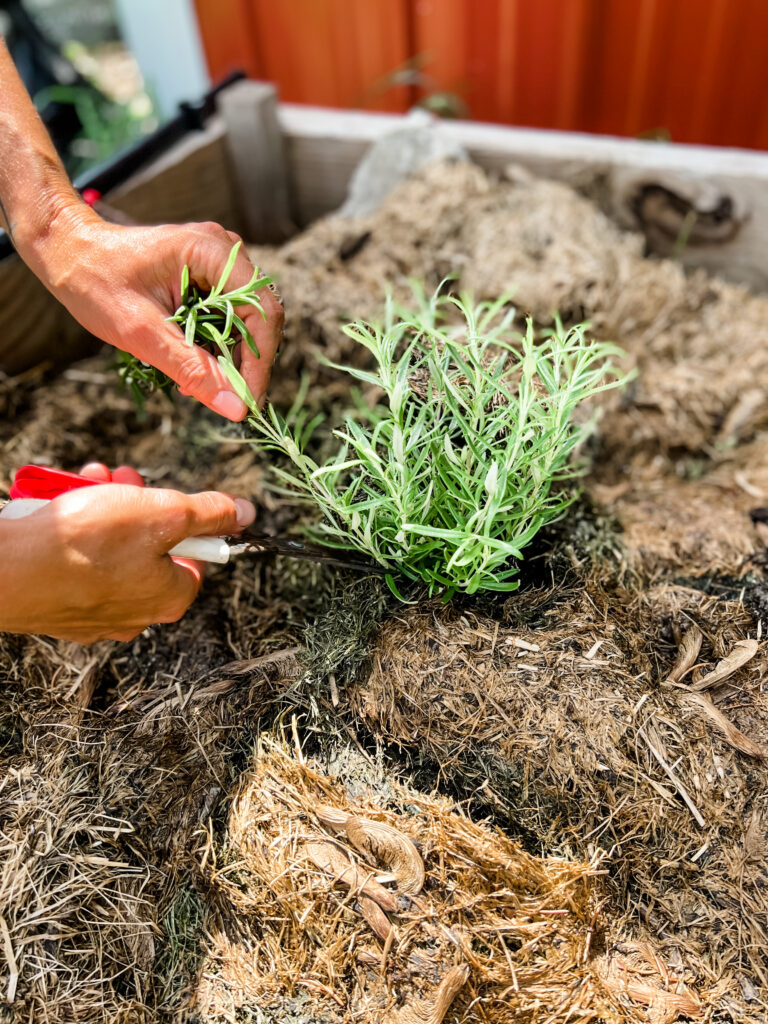
Rabbits, just like chickens will trade food for easy garden compost. Unlike chickens, rabbit manure is easier to handle and is a slow-release fertilizer for your garden. Chicken manure needs to be composted down for a few months before it can be added to your garden. This is because it is high in nitrogen and can burn your plants and seedlings if not composted down enough.
Rabbit manure is considered “cold” meaning you don’t have to compost it down or do anything with it before putting it in your garden. When I’m planting up my new plants/ seeds, I simply dig a little hole, drop a rabbit poo into the hole and then add my seed or plant and water. It’s as simple as that! We have a cut flower farm. We plant with the intention to use and harvest the flowers (check out Minnesota Fresh Flower Subscription for more info). It doesn’t matter what type of farm or garden you have, the manure works just the same!
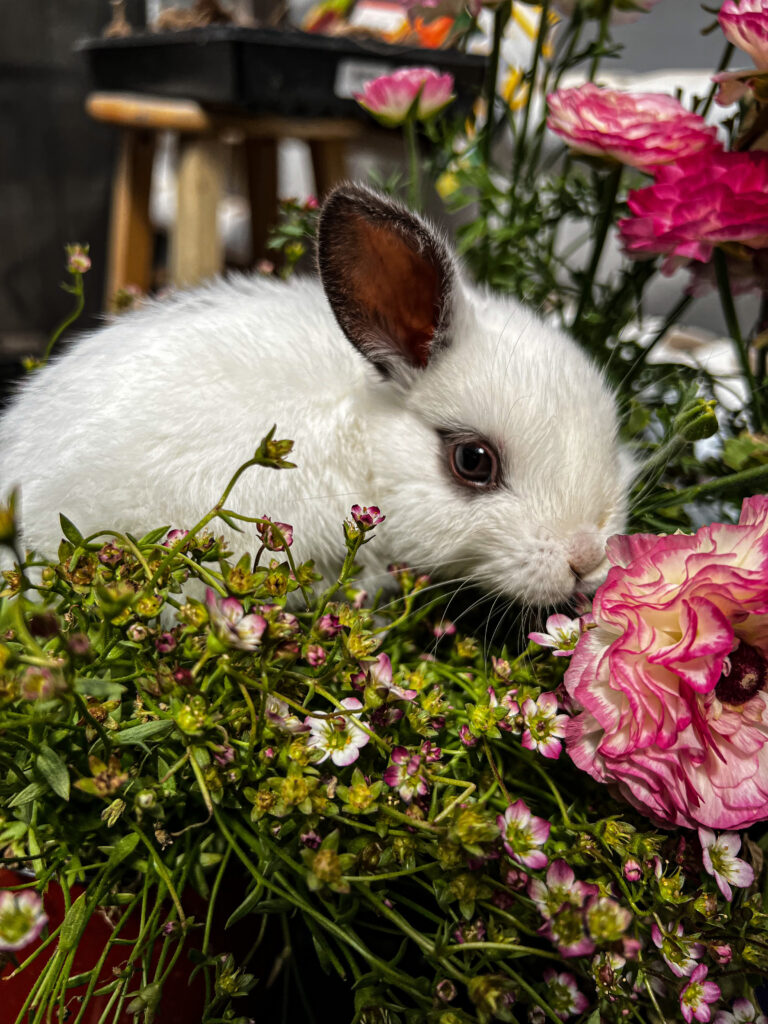
2. They Help Ground Conditions
In their natural movement around your flower beds or vegetable plants, these rabbits will graze, dig, and mix up some of the soil. This allows more air and water to reach the roots of the plants. The movement also allows for more space for the plant to grow. All of this promotes growth for you garden. This movement of the soil also makes living more optimal for other species. Check out our “frequently asked question” section to see why these rabbits have the title of keystone species!
3. Longevity
Not only are their droppings reliable but so are these rabbits – they can live 8 to 11 years! Doing their “job” doesn’t take much effort. For these backyard rabbits this simply means going through their daily routines of eating, etc. This means that they are consistent. As long as you have your rabbit in your backyard, you won’t need to worry about directing them. These tiny workers won’t ever need PTO 🙂
This also means that any male or female rabbit and any old or young rabbits can be a help to your garden. You don’t need to start off with baby rabbits to get the same benefits.
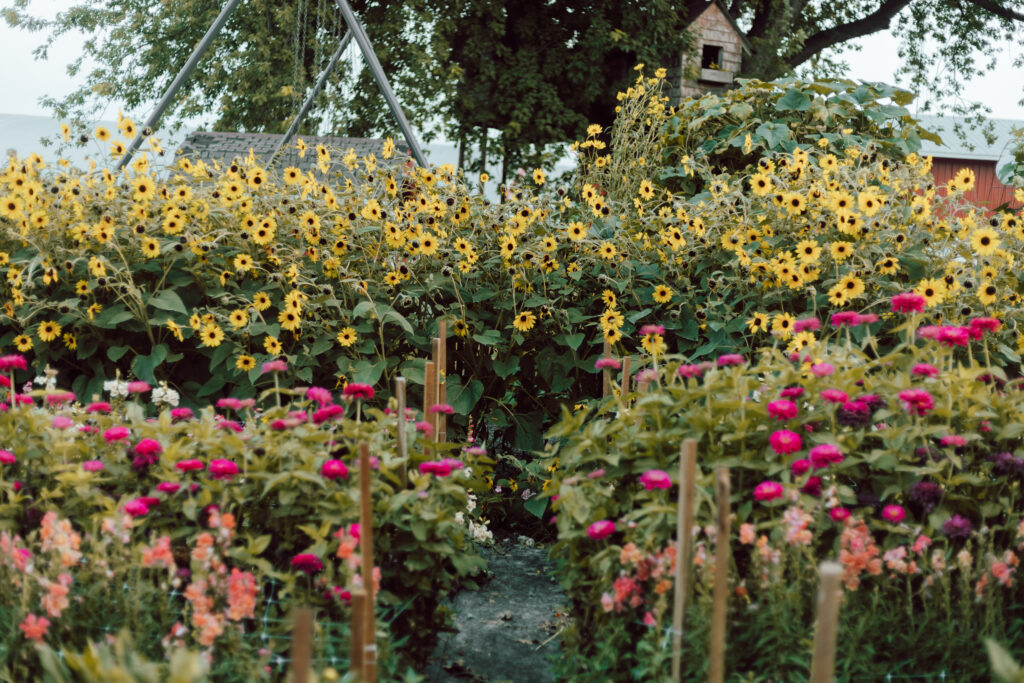
4. Living off the land
Rabbits will turn to their natural diet and can easily compost up most of your fruit and veggies scraps. However, there are a few things your rabbit might not be interested in. Gardens and backyards can be weedy areas. A question that comes up a lot is “what are backyard safe weeds for rabbits?”. To make your garden a safe place for a rabbit, here are the most common plants, foods, and weeds you should be aware of:
Rabbits should not eat: Raw Onions or Raw Potatoes, Leeks, Garlic, Rhubarb, Iceberg Lettuce, Mushrooms, Fruit Seeds/Pits, and Avocados
Rabbits can eat but tend to avoid (aka may turn a rabbit away from your garden): Asparagus, Squash, Tomato, Artichokes, Cucumbers. For plants and herbs, rabbits tend to stay away from strong scents: Basil, Mint, Parsley, Vincas, Geraniums, Wax Begonias, and Cleomes
Weeds / Plants safe for rabbits to eat: Daisy, Clover, Dandelion, Pansies, Roses, Chickweed, and Sunflowers
Weeds / Plants toxic to rabbits: Foxgloves, Buttercups, Poppies, Azalea, Daffodils, Hemlock, and Bindweed
Check out our blog “The Best Way to Keep a Garden Weed – Free” to learn how to make garden mulch to keep weeds away.
5. Urine Pesticide
As if their poop doesn’t help your garden enough, rabbit urine is also considered a natural pesticide and fertilizer. Their pee has also been known to repel unwanted insects in your garden because of the smell the insects get from it. This is because their pee, just like their manure, contains nutrients your plants need to grow: nitrogen, phosphorus, and potassium. Another way to say that just letting your rabbit roam around your garden can do wonders!
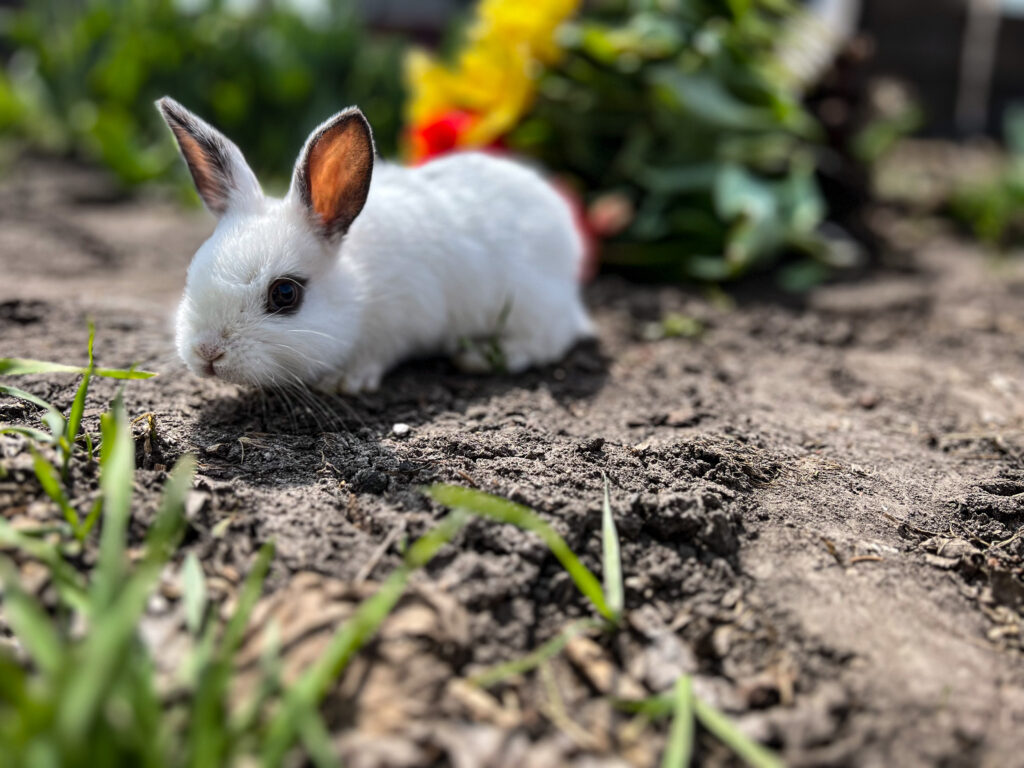
What Can I do with a Bunny or Rabbit?
There are many things you can do with a rabbit, depending on your interests and goals. Here are some ideas:
- Pet: Rabbits can make excellent pets. They are affectionate, social, and can be easily trained to use a litter box. They also have unique personalities and can provide companionship and entertainment.
- Show: If you have a purebred rabbit, you can show them in local or national rabbit shows. Showing rabbits can be a fun and competitive hobby and can also help you connect with other rabbit enthusiasts.
- Breeding: If you have a pair of rabbits, you can breed them to produce litters of baby rabbits. Breeding rabbits can be a way to create a sustainable food source, or to produce rabbits for sale as pets, show rabbits, or breeding stock.
- Meat: Rabbit meat is a lean protein source that is often used in traditional cuisine. If you have a rabbitry, you can raise rabbits for meat production. However, it is essential to ensure that the rabbits are raised and processed humanely.
- Fur: Rabbit fur can be used to make clothing and accessories. If you have a breed that is known for their fur, you can harvest the fur after the rabbit has passed away, or you can carefully shave it.
- Therapy: Rabbits can be used in animal-assisted therapy to help people with mental or physical health issues. Rabbits can provide a calming and soothing presence and can help reduce stress and anxiety.
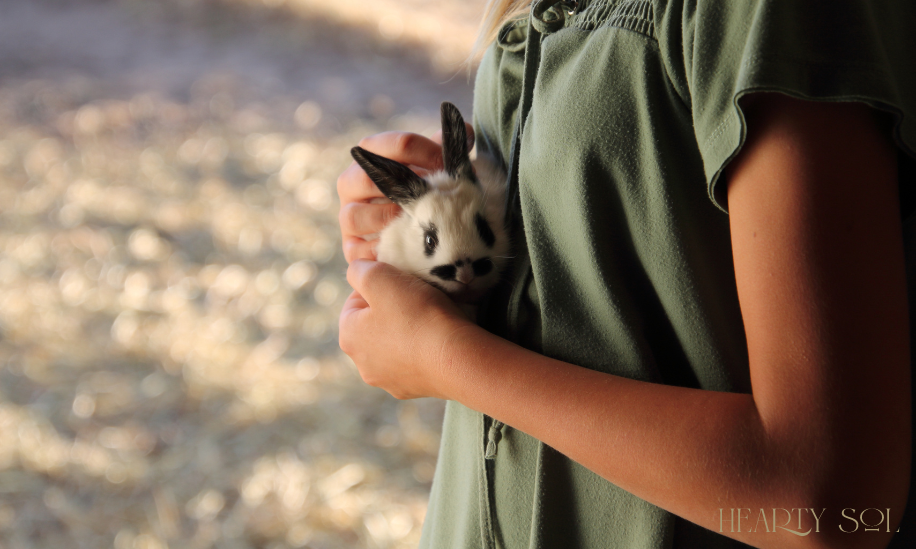
Rabbit Care
What do backyard rabbits eat?
A Rabbit’s diet mainly consists of weeds, fruit or veggie scraps, grass, twigs, and bark.
What to feed backyard rabbits?
Wild Rabbits will be just fine with the food in their natural environment. However, if you notice some new friends hanging around in your garden this season, you can give them some hay. The type doesn’t matter – you can have grass hay, alfalfa, etc. As for domestic garden rabbits, pellets along with their natural diet of grass and weeds (meaning their food availability shouldn’t be a problem) will help maintain their health and body weight.
Backyard Rabbit Enclosures (Summer and Winter Backyard Rabbit Care)
Taking care of these Outdoor Rabbits doesn’t require much space, they can live in any large or small backyard. As far as the type of shelter, they will nestle into their crates or wire cages at night.
For those of you who live in a state with all four seasons, like us here in Minnesota, you will have to take the changing weather into consideration. The best way to do this is to build an outdoor rabbit hutch. In both the summer and winter months, the wire in the rabbit hutches (you can use a chicken wire fence or mesh wire) will allow for sunlight and ventilation. The roof will protect them from inclement weather and extreme temperatures. To keep this enclosure warm in the winter, be sure to add extra hay/bedding and you will be best throwing a tarp, newspaper, and/or a blanket over the sides. This will block them from the cold weather while still allowing enough room for ventilation.
Once they are set up in their enclosures, set them up with a good amount of straw/hay, a water source, and they will have plenty of food right from your own backyard. Read the full blog post about How to Care for a Rabbit | Bunny 101 here.
Our Rabbit Tea Recipe:
Go check out how you can turn this rich nutrient dense rabbit manure into A Rabbit Compost Tea!
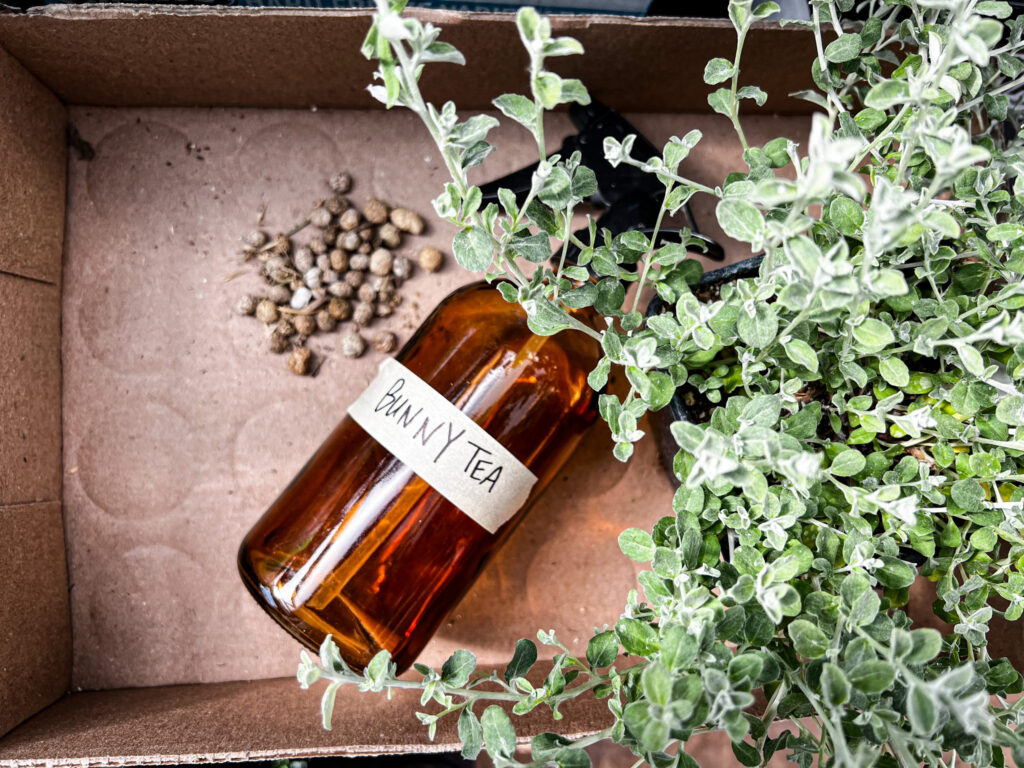
Frequently asked questions about Backyard Rabbits
| Outdoor Rabbit Breeds Some species of hares are better suited to live outside, these include: – New Zealand White Rabbit – Checkered Giant Rabbit – Dutch Rabbit – French Lop Rabbit – Belgian Hare Rabbit |
| What is a keystone species? Put your biology hats on! In the simplest terms, a keystone species holds their ecosystem together. These small mammals have a large role – they are essential for maintaining life. If they go extinct or are taken away from their habitat, their ecosystem will change drastically and can completely collapse. The rabbit population is important because their grazing and digging helps maintain ground conditions, they help keep plant life in check, and they provide a food source for their predators. Other examples of keystone species are Grizzly Bears, Sea Otters, and Woodpeckers. |
| Where would I get Rabbit Manure if I don’t have a Rabbit? Ask around to your friends or neighbors who live in the city with bunnies or rabbits. They might be looking for a place to off load their bunny waste. This is a free way to use a biology that is already naturally created! Many organic gardeners will turn to rabbit manure. |
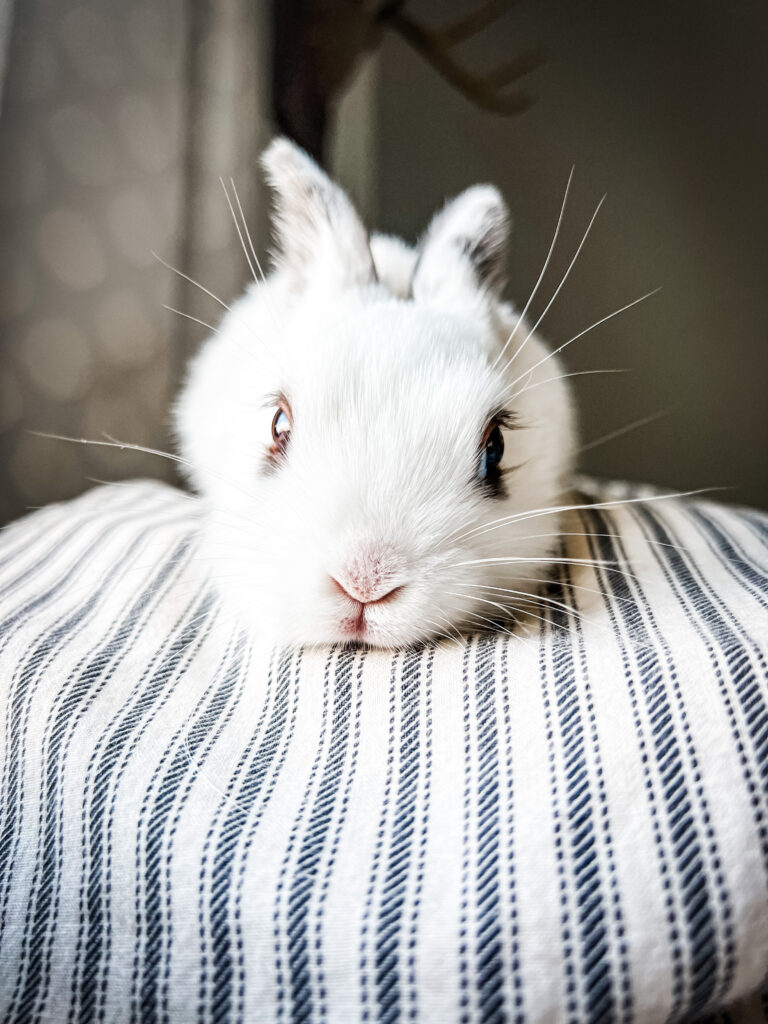
Pin for Later!
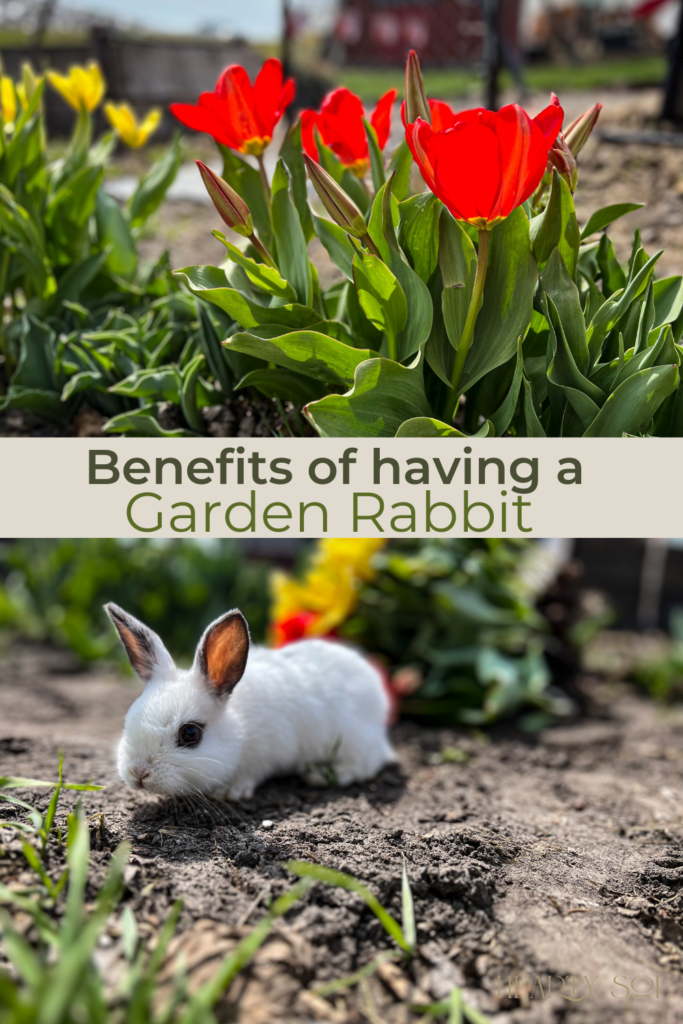
Check out other related blog posts!

Affiliate Disclosure & Content Disclaimer
This post may contain affiliate links from a paid sponsor, Amazon or other program. When you use these links to make a purchase I earn a small commission at no extra cost to you. This allows me to continue creating the content that you love. The content in this article is created for information only and based on my research and/or opinion.
Emily T.
DAILY INSPIRATION ON THE GRAM @hearty.sol
it's hip to be square!
View comments
+ Leave a comment